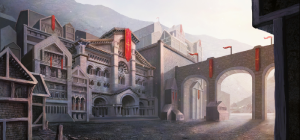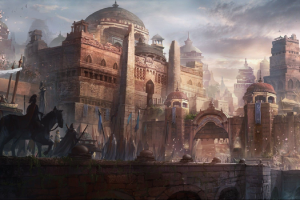
Gild
NEW WIKI LOCATED HERE
"My passion for Gild's past fills me with such effluence of spirit that I must in turn hope it has not impaired my judgment; all across Arethil have I studied, in nations both large and small, young and old, yet I do honestly believe that nowhere else can be found a country greater in cause, purer in spirit, richer in deeds."
— Balian Terral, Gildan Historian
Piety marks the heart of a true Gildan.
So has it been said by Gild's founder, its one true king, Saint Andreas Gildal. Jura is the state religion of Gild, and temples to Regel are plentiful throughout the city and its controlled territories. The most prominent of the precepts of Jura is that magic is the exclusive domain of the gods, and its use by mortals is therefore sinful, immoral, blasphemous. Hereby is Gild's distinctive signature made: in a world replete with magic, Gild stands alone as being staunchly opposed to its usage.
For the fulfillment of Regel's will and the safeguarding of all Gildan citizens against the everpresent threat of the chaotic and arcane, Gild has its one and only shield.
The Praetors.
Overview
Demographic
 Humans are the majority of citizens, with a large minority of dwarves, a smaller minority of ogres, and an even smaller minority of other species. The Religion of Jura binds the variety of citizens together, and collectively do Gildans sometimes refer to themselves as "The Community", or "The Jemaat" in their old tongue.
Humans are the majority of citizens, with a large minority of dwarves, a smaller minority of ogres, and an even smaller minority of other species. The Religion of Jura binds the variety of citizens together, and collectively do Gildans sometimes refer to themselves as "The Community", or "The Jemaat" in their old tongue.The city's human population is among Gild's original inhabitants, though certainly many more have come in the time since; a few dwarves were also among the founding citizens, but many are from clans who came from Belgrath and other dwarven holds later on in the city's history; the ogres are the descendants of the tribe of mountain ogres whom Andreas Gildal himself spared from certain death and pardoned, and they believe themselves bound by honorable Blood Debt to the Gildan interest.
Having begun as a small settlement of persecuted refugees, Gild has maintained an open policy of immigration. This, however, is entirely predicated on a prospective immigrant's willingness to convert to the religion of Jura (at least outwardly) and adopt Gildan culture—which includes the eschewing of magic. For some this is an easy term to accept, especially among those who have been scarred, traumatized, or in some way badly affected by the use of magic about Arethil. Exile from Gild is prescribed for those who fail to integrate into, or abide by, the Gildan way of life.
Though cordial and reverential respect is paid to the good-aligned gods of other religions (known as the Gods of Order to Jurists), Jura is the dominant religion, made so both on a cultural level and by state decree.
 Species that are inherently magical in nature (genasi, Fae, elementals, demons, etc.) are considered abominations, and it is the duty of all good Gildan citizens to do them harm if they are able, or to inform relevant authorities of sightings if they are not. Vampires, werewolves, and shapeshifters of all kinds are also considered abhorrent (though less so than inherently magical creatures) as it is believed that these conditions are magical in nature and cannot be cured by mortal means.
Species that are inherently magical in nature (genasi, Fae, elementals, demons, etc.) are considered abominations, and it is the duty of all good Gildan citizens to do them harm if they are able, or to inform relevant authorities of sightings if they are not. Vampires, werewolves, and shapeshifters of all kinds are also considered abhorrent (though less so than inherently magical creatures) as it is believed that these conditions are magical in nature and cannot be cured by mortal means.There are three socioeconomic classes within Gild:
- The Nobility, also known as the Class of Gold, who are divided into the Five Houses, each House calling back to a distinguished and heroic progenitor among Gild's original Turkal inhabitants.
- The Beyars, also known as the Class of Bronze, who have wealth close to that of the Nobility, and who are organized into smaller Clans (adopting the dwarven traditional nomenclature even if they are not dwarves) instead of larger Houses.
- The Insanlar, also known as the Class of Silver, who make up the bulk of the citizenry and are the commoners. It is not uncommon for an Insan to rise up to the Beyar class, or for a Noble to marry a Beyar or distinguished Insan.
Designation
Gild is a small-medium city located in central Campania. Nominally a Kingdom, its government is in practical fact a consular republic, and Gild has within its domain a few smaller towns and villages.

The Region of Campania is that of a lush green land, with open grasslands, foothills, and scattered forests, replete with many rivers running down the mountains of the Spine and emptying into the Anatol Sea—those waters of the Asherah Ocean which touch the Campanian coast. This picturesque land is filled with a large number of city-states and nations, of which Gild is one (and not particularly notable in prominence). Though beautiful, Campania is sometimes referred to as "The Bloody Crescent" for the number of raids, skirmishes, and wars the region has seen between all its rival nations. Indeed, the balance of power is constantly shifting, alliances made and broken, and for centuries no one nation has been able to claim mastery over the region as a whole.





The Region of Campania is that of a lush green land, with open grasslands, foothills, and scattered forests, replete with many rivers running down the mountains of the Spine and emptying into the Anatol Sea—those waters of the Asherah Ocean which touch the Campanian coast. This picturesque land is filled with a large number of city-states and nations, of which Gild is one (and not particularly notable in prominence). Though beautiful, Campania is sometimes referred to as "The Bloody Crescent" for the number of raids, skirmishes, and wars the region has seen between all its rival nations. Indeed, the balance of power is constantly shifting, alliances made and broken, and for centuries no one nation has been able to claim mastery over the region as a whole.




Description
Architecture
Owing to the range of heights among the three primary races which inhabit Gild, certain features needed to be adopted for Gildan architecture, and thus have contributed toward a particular and unique style.
Public buildings, having to accommodate for Gildan ogres who can stand at an upwards of ten feet tall, feature high ceilings and plenty of sweeping arches. Doors are similarly tall (and wide) and tend to resemble the great arched doors of churches all the world round. Indeed, with such generally grand scale and design, visitors often describe Gild as "the City of Temples." Many buildings feature heated floors and walls through the use of hollow bricks (or applicable building material) where warm air from basement fires can circulate. A variety of local materials are used for the construction of buildings, but buildings of significant government or religious importance feature plenty of marble and fine stone.
Private buildings, however, can vary. Some adhere to the overall Gildan style, but some are built specifically to accommodate their particular occupants, be they dwarven, human, ogre, or all else. In a neighborhood this can lead to a variety of shapes and sizes of the homes, and also to reconstruction if a home's dimensions need to be made smaller or larger to accommodate new ownership.
Gild as a city does not have a destitute "slums" section. Wealth among the Insanlar varies, of course, but none are allowed by the community to fall so low as to level in squalor and degradation, and much is owed to the Jurist practice of Zekat for this, as well as the Gildan sense of public spirit at large.
The River Sulh runs through Gild. Though dwarfed in size by the Rivers Astor and Galacon, the Sulh supplies Gild with plentiful freshwater. At some points in the city the Sulh runs through canals and bridges are built over it, in others the Sulh runs through underground channels and is hidden from view.
Public buildings, having to accommodate for Gildan ogres who can stand at an upwards of ten feet tall, feature high ceilings and plenty of sweeping arches. Doors are similarly tall (and wide) and tend to resemble the great arched doors of churches all the world round. Indeed, with such generally grand scale and design, visitors often describe Gild as "the City of Temples." Many buildings feature heated floors and walls through the use of hollow bricks (or applicable building material) where warm air from basement fires can circulate. A variety of local materials are used for the construction of buildings, but buildings of significant government or religious importance feature plenty of marble and fine stone.
Private buildings, however, can vary. Some adhere to the overall Gildan style, but some are built specifically to accommodate their particular occupants, be they dwarven, human, ogre, or all else. In a neighborhood this can lead to a variety of shapes and sizes of the homes, and also to reconstruction if a home's dimensions need to be made smaller or larger to accommodate new ownership.
Gild as a city does not have a destitute "slums" section. Wealth among the Insanlar varies, of course, but none are allowed by the community to fall so low as to level in squalor and degradation, and much is owed to the Jurist practice of Zekat for this, as well as the Gildan sense of public spirit at large.
The River Sulh runs through Gild. Though dwarfed in size by the Rivers Astor and Galacon, the Sulh supplies Gild with plentiful freshwater. At some points in the city the Sulh runs through canals and bridges are built over it, in others the Sulh runs through underground channels and is hidden from view.
Points of Interest
 The Senate Hall: Here sits the center of power within the city, this great construction of stone and silver, glass and marble. The Fathers of Gild gather in the Senate floor to discuss the issues of the day both foreign and domestic, mediate between the interests of the Insanlar, the Beyars, and the Nobility, and ensure that all religious duties are upheld. Both consuls maintain offices here, and as well the Council of Praetors provides a place for Praetors to gather and discuss the motions of the Senate and other matters of state.
The Senate Hall: Here sits the center of power within the city, this great construction of stone and silver, glass and marble. The Fathers of Gild gather in the Senate floor to discuss the issues of the day both foreign and domestic, mediate between the interests of the Insanlar, the Beyars, and the Nobility, and ensure that all religious duties are upheld. Both consuls maintain offices here, and as well the Council of Praetors provides a place for Praetors to gather and discuss the motions of the Senate and other matters of state. The Krala Ait: Adjacent to the wealthy properties of the Nobility stands the district known as the Krala Ait. Here are the luxurious villas afforded to the Praetors and their families, all of which have distinctive red tile roofs. Within the District as well is the War College, which serves to train not only newly discovered Praetors (called Quaestors as they are in training) but also to instruct young Nobles in the arts of command and strategy and of course combat itself; often, a good many connections are forged here between these young Quaestors and Nobles as they learn and grow together. Access to the Krala Ait is restricted, and its secondary walls and Citadel allow it to serve as a place for a highly defensible last stand in case of the worst.
The Krala Ait: Adjacent to the wealthy properties of the Nobility stands the district known as the Krala Ait. Here are the luxurious villas afforded to the Praetors and their families, all of which have distinctive red tile roofs. Within the District as well is the War College, which serves to train not only newly discovered Praetors (called Quaestors as they are in training) but also to instruct young Nobles in the arts of command and strategy and of course combat itself; often, a good many connections are forged here between these young Quaestors and Nobles as they learn and grow together. Access to the Krala Ait is restricted, and its secondary walls and Citadel allow it to serve as a place for a highly defensible last stand in case of the worst.The Forum: A great open air plaza surrounded by markets and shops, the Forum is a place of congregation for the Insanlar and commerce of all kinds. Usually the most lively place within the city on any given day, the Forum is as well the center of many celebrations and festivals. Marble pillars line the Forum and banners with the symbols of Jura hang from them; these banners bring the Forum truly alive with colors of gold, bronze, and silver, representing the Nobility, the Beyars, and the Insanlar respectively. Town Criers can be heard daily reading off the latest news from around the Kingdom (or advertisements) with their expressive gestures and entertaining styles. Corporal punishments and executions are also publicly on display within the Forum, ensuring to all Gildans that the Right Ordering is upheld within the city.
The Amphitheatre: Gild is not without its patronage of the arts—indeed, given how isolating their worldview tends to be, their culture by necessity must be able to thrive on its own. The Amphitheatre is not the only theatre of its kind within Gildan territory, but it certainly is the largest. An open-air venue, the stage is surrounded by a half-circle of rising rows of seats that can comfortably house hundreds of audience members. Here, plays and performances of nearly all kinds are held almost daily, and more spectacular shows are put on during holidays, festivals, and special celebrations.
 The Great Bath: A wonder of Gildan engineering and one of the more popular destinations for visitors to the city, the Great Bath is a large, enclosed facility that features not only communal baths but also smaller, private baths as well. The main draw of the Great Bath is that all baths feature heated water (via furnaces in the basement beneath the pools), and the private baths can also be customized with fragrances for an additional fee if one chooses. The Great Bath is sex-segregated, with two separate entrances for men and women and no internal connections between these two halves of the building.
The Great Bath: A wonder of Gildan engineering and one of the more popular destinations for visitors to the city, the Great Bath is a large, enclosed facility that features not only communal baths but also smaller, private baths as well. The main draw of the Great Bath is that all baths feature heated water (via furnaces in the basement beneath the pools), and the private baths can also be customized with fragrances for an additional fee if one chooses. The Great Bath is sex-segregated, with two separate entrances for men and women and no internal connections between these two halves of the building. Temple of the Everburning Flame: Many temples of Jura dot the cityscape of Gild, but the Temple of the Everburning Flame was the first and remains the most prominent. A grand structure with many lavish marble fixtures, the Temple houses the sacred Fire lit by Fiona Gildal—wife of Andreas—to mark the founding of Gild itself, and for centuries the Fire has been continuously kept by the Bakire priestesses (indeed, only women sworn to chastity are considered pure enough to tend the Flame; it is forbidden for men to do so). The Temple also serves as the headquarters of the Church of Jura, with all of the seniormost clergy having chambers here; additionally, the Sanctum, a separate building (fashioned like a small fortress) on the Temple grounds, is home to the Church's Regulators. The Ragged Banner, the symbol which represented Gild's founders and earliest inhabitants, is also housed in the Temple and carefully preserved. It is tradition, as well, for the newly elected consuls each year to be blessed by the Bakire priestesses at the foot of the Temple, their foreheads marked with sacred ash from the Flame to signify the rightful granting of stewardship of the Kingdom into their hands.
Temple of the Everburning Flame: Many temples of Jura dot the cityscape of Gild, but the Temple of the Everburning Flame was the first and remains the most prominent. A grand structure with many lavish marble fixtures, the Temple houses the sacred Fire lit by Fiona Gildal—wife of Andreas—to mark the founding of Gild itself, and for centuries the Fire has been continuously kept by the Bakire priestesses (indeed, only women sworn to chastity are considered pure enough to tend the Flame; it is forbidden for men to do so). The Temple also serves as the headquarters of the Church of Jura, with all of the seniormost clergy having chambers here; additionally, the Sanctum, a separate building (fashioned like a small fortress) on the Temple grounds, is home to the Church's Regulators. The Ragged Banner, the symbol which represented Gild's founders and earliest inhabitants, is also housed in the Temple and carefully preserved. It is tradition, as well, for the newly elected consuls each year to be blessed by the Bakire priestesses at the foot of the Temple, their foreheads marked with sacred ash from the Flame to signify the rightful granting of stewardship of the Kingdom into their hands.Templar Barracks: Though no Templar Chapter is based within Gild, still the city maintains a modest barracks complex for itinerant Chapters to find rest, resupply, and succor. This open invitation, naturally, does not extend to all Chapters, but only to those Templar who oppose the use of magic and/or view it as a source of evil upon Arethil, or, more generally, align with the worldview of Jura is some agreeable capacity. Praetors and likeminded Templar from ideologically-aligned Chapters usually have quite good working relationships with one another, and indeed the Praetors often use their political sway to see to the needs of their Templar friends whilst they billet within the city. The Templar Barracks also doubles as a place for foreign mercenaries hired by Gild to be billeted.
Background
History
I. Centuries ago, during the fracturing and collapse at the end of the Age of Expansion, did Andreas Gildal lead the struggling remnants of the Turkal people and other refugees from the Taagi Baara Steppes, across the Spine, and into the green lands of Campania. With them they carried the obscure religion of Jura, one of the many religions persecuted during the height of the Age of Expansion. After a long journey was a suitable site located, and upon this spot did Andreas plant the Ragged Banner which had come to symbolize the refugees, and so claimed dominion over the land. Here it was that the city of Gild would be founded. Here it was that the Jemaat, the Community, could at last find rest and build a future.
II. The work of building the early city was immense. Every hand of the Community was engaged, those of the young and old, those of men and women, all alike in their endeavor and shared of the common task. But despite their ethic and their spirit, the ordeal still eclipsed the ability of the Community to complete in a timely manner—for Campania was fraught with its own dangers, and walls needed to be erected. So it was that Andreas asked of his beloved wife, Fiona Gildal, to form a delegation and entreat the dwarves of Belgrath for what aid they could offer. Dutifully she did this, and so gifted did she prove in diplomacy that the Pact of Friendship between Gild and Belgrath formed by her endures to this very day; still she is remembered fondly as "Peacemaker" in both Belgrath and Gild alike. Owing to her grace, many of the dwarven laborers and craftsmen which came to assist in construction per the treaty decided to settle permanently in Gild, and so did the population grow.
III. The Community's first test would come not from wary or warmongering Campanians, but from a migrating tribe of Ogres descending from the Spine. These mountain ogres had found success in their raids on other nations within Campania, and when their scouts reported that the city of Gild had not yet completed its walls, they moved with all haste to what seemed easy spoils. Andreas Gildal was told of their coming, and he called every Gildan man able to bear arms to meet the threat. Yet such was the might of the ogre tribe that a field battle would spell disaster even in victory, for such a victory would be so costly as to be indistinguishable from defeat. Andreas, therefore, devised a clever ambush using terrain to his advantage in a narrow gorge. There he trapped the ogre tribe on their march, and so unfavorable were the conditions that every single ogre could have been wiped out with ease. Yet Andreas did not do this. Instead, he offered generous terms to the ogres: clemency, and the offer to any ogre among them of a place in the Community, or to simply leave and return to the Spine. So astounded were the ogres by this benevolence that an unstoppable wave of gratitude and honorable acceptance swept among them. A Blood Debt owed to Andreas Gildal, enforced by the belief in their own god of Threshkuul, was thus formed, and the ogres of this tribe pledged themselves to him, to Gild, and to the Flame of Jura. Thus again did the population of the Community grow.
IV. Bolstered now by the strong and capable hands of dwarves and ogres, the Community saw the first iteration of the city completed, and here at last did it officially come to be known as Gild, its citizens no longer Turkal but Gildan, for Andreas had been proclaimed by the people to be King and all the Jemaat took on his hallowed name. Yet in Andreas's eyes the duties of piety had yet to be fulfilled, and what power the people bestowed upon him would mean nothing if not ratified by their common God of Regel. So Andreas dedicated the construction of the first Temple of Jura in Gild, and the first of such as well upon Campanian soil: the Temple of the Everburning Flame. On the spot where the Ragged Banner had been planted was the Temple built. To his wife Fiona did Andreas give the honor of lighting the Flame, and, acting then as representative of the people and vessel of Regel Himself, did Fiona mark Andreas's forehead with the sacred ash. All Gild was now entrusted to him, as was the fate of Jura itself. In these years of peace would Andreas come to stress piety and public spirit above all things, and the Community was thus invigorated with a vibrant and hearty soul.
V. The Bloody Crescent would soon welcome Gild into its fold. The city-state of Cura to the north of Gild stood as its direct opposite, venerating magic and those possessed of it as gods. When the Curites would come to know of Gild and of Jura, animosity was immediate and war inevitable. The First Curite War began with lightning raids upon the farmlands surrounding Gild. Knowing the enemy's heavy reliance upon magic, King Andreas called forth those men and women gifted as Nulls. Sources conflict as to how many Nulls there were, how they knew they were Nulls, or if for some their gifts in anti-magic went beyond merely being Nulls; it is accepted canon by the Church of Jura that when the Everburning Flame was lit, Regel blessed a select number of Gildans (and continues to do so to this day) and made them destined to be his Holy Warriors. Several key battles marked the First Curite War, and indeed the Curites were shocked by the tactics employed against them, these effecting the deaths of many of their revered mages. They sued for peace before the assault on Cura itself could begin, and King Andreas accepted and imposed terms upon them. Those veteran Nulls who served in the war King Andreas would name his Praetors, the first of their kind, and they would serve as Gild's finest defenders against the blasphemous use of magic.

VI. The first Praetors soon came to be more than valiant warriors who served the Community—more even than knights, their closest equivalents, in lands abroad. The Praetors were revered by the people as leading citizens of the Community, and furthermore as figures touched by Regel's divine hand. They were more than merely the flesh and blood of which they were made, hailed as shining examples of service and piety. Indeed, in the domain of service, King Andreas welcomed them as trusted advisors, marking the inception of the Council of Praetors and their status as warrior statesmen. In the domain of piety, it was three distinguished Praetors who took it upon themselves to organize and establish the Church of Jura, bolstering the religion and establishing the proper rites and rituals as derived from The Testimonies. These are the acts of the first Praetors which enriched the Community.
VII. In peace did Cura prepare for war against its hated enemy of Gild, and by vowing its destruction would the Second Curite War be marked by annihilation: either of Gild or of Cura, for in no other fashion could it end. Again the Curites began their war with raids upon the countryside, pillaging fields and towns. Yet when King Andreas took his army out to meet them, a terrible omen preceded him (many blame Dark Magic of the most foul and evil kind), and his army was routed in the battle. The Curites assaulted Gild itself, and pushed what meager defenders were left to the Krala Ait and further into the Citadel itself. A true hero would become known in these dire times: Fatima Maisal. Fatima not only organized the defenders of the Citadel when all other efforts failed, but performed a miraculous feat in the name of piety. She escaped from the Citadel, evaded the Curites bewildered by the audacity they perceived, performed an important religious ritual in the Temple of the Everburning Flame such that its observance would not be allowed to lapse, and then returned to the Citadel and its defenders. King Andreas eventually rallied his beaten army and took back Gild from the Curites in a protracted and bloody battle.
VIII. Though the Battle of Gild had been the worst of the Second Curite War, the struggle was not yet over. Gild still needed to take the offensive in Curite territory. Here both the tradition of hiring foreign mercenaries and of inviting Templars into Gildan affairs were each founded, for the ranks of the army needed to be replenished. This combined force led by King Andreas penetrated into Curite lands, turned the tide of the war, and eventually took by storm the city of Cura itself. Resistance was fierce, the slaughter bitter, and even those Curites who survived—in their hatred—spat upon any notion of Gildan peace again. King Andreas therefore saw to the utter destruction of Cura, and to the exile of those last few Curites from Campania. Nothing remained when all was done. Back in Gild, King Andreas honored Fatima Maisal's incredible deeds, proclaiming that Regel himself willed her to be his servant. King Andreas granted her a boon of salt and silver, thus enriching her with great wealth, and though Fatima Maisal was not of Noble blood he thought it a religious matter for her to form a dynasty. So became Clan Maisal, Gild's only matrilineal dynasty, and Fatima as "Mother of the Beyars," Gild's affluent but non-noble class of citizen.
IX. King Andreas was of an old age after the Second Curite War. He had by then three grown sons and two daughters, and the time was approaching when his first born son and heir, Altan, would succeed him. But tragedy and wickedness would darken the elder years of King Andreas's life. The second born son, Erol, had his heart turn black from envy and wrath over Altan, and so he conspired to have Altan murdered such that he would claim majesty over Gild instead. The deed was done, Altan slain, but Erol's plot was discovered. King Andreas was distraught, but he himself set to rights this vile criminal act: King Andreas publicly executed his son Erol for all Gild to see. Though his youngest son, Eneas, was of a calm and rational disposition and would make for a good king, still King Andreas was deeply disquieted by the threat of fratricides if a monarchical government endured. So he gathered the leading Nobles of the day, as well as the Council of Praetors, to come up with a new way forward for Gild; one that would honor Regel, uphold Jura, and serve the Gildan people.
X. The establishment of the Senate, of the annually elected consuls to lead it, and of the Council of Praetors to advise it (and keep checks on it) would be King Andreas's last great act upon Arethil. As it had been with himself, King Andreas oversaw the first two consuls as they too were marked upon their foreheads by Fiona Gildal with the sacred ash from the Everburning Flame, thus consecrating the power invested in them by Regel and by the people of Gild. With his legendary deeds done and the Kingdom of Gild now in safe and capable hands, with his work of saving the religion of Jura from extinction complete, King Andreas Gildal then ascended to the Fields of Duzen. He was declared to be a Saint by the Church of Jura the following day, and all Gild wept to see him departed from Arethil.
XI. So ended the time of King Andreas Gildal. And as the years and centuries progressed, many a story has made rich the ongoing history of Gild: from the Corrupt Consul who refused to give up his power, to the sainting of Sofia Immal who saved a Gildan army from utter destruction, to the beginning of the bloody rivalry with Arveii on the coast of Campania, to the fall of Reikhurst (they who in part adopted Jura as well) in the west and the plague of vampires now therein—these events and more. In these brimming annals one may find fine deeds to take as example, as well as base things to avoid. And through it all, even so into the present day, one truth remains supreme:
Gild is the last flame of Jura, and it shall endure.
II. The work of building the early city was immense. Every hand of the Community was engaged, those of the young and old, those of men and women, all alike in their endeavor and shared of the common task. But despite their ethic and their spirit, the ordeal still eclipsed the ability of the Community to complete in a timely manner—for Campania was fraught with its own dangers, and walls needed to be erected. So it was that Andreas asked of his beloved wife, Fiona Gildal, to form a delegation and entreat the dwarves of Belgrath for what aid they could offer. Dutifully she did this, and so gifted did she prove in diplomacy that the Pact of Friendship between Gild and Belgrath formed by her endures to this very day; still she is remembered fondly as "Peacemaker" in both Belgrath and Gild alike. Owing to her grace, many of the dwarven laborers and craftsmen which came to assist in construction per the treaty decided to settle permanently in Gild, and so did the population grow.
III. The Community's first test would come not from wary or warmongering Campanians, but from a migrating tribe of Ogres descending from the Spine. These mountain ogres had found success in their raids on other nations within Campania, and when their scouts reported that the city of Gild had not yet completed its walls, they moved with all haste to what seemed easy spoils. Andreas Gildal was told of their coming, and he called every Gildan man able to bear arms to meet the threat. Yet such was the might of the ogre tribe that a field battle would spell disaster even in victory, for such a victory would be so costly as to be indistinguishable from defeat. Andreas, therefore, devised a clever ambush using terrain to his advantage in a narrow gorge. There he trapped the ogre tribe on their march, and so unfavorable were the conditions that every single ogre could have been wiped out with ease. Yet Andreas did not do this. Instead, he offered generous terms to the ogres: clemency, and the offer to any ogre among them of a place in the Community, or to simply leave and return to the Spine. So astounded were the ogres by this benevolence that an unstoppable wave of gratitude and honorable acceptance swept among them. A Blood Debt owed to Andreas Gildal, enforced by the belief in their own god of Threshkuul, was thus formed, and the ogres of this tribe pledged themselves to him, to Gild, and to the Flame of Jura. Thus again did the population of the Community grow.
IV. Bolstered now by the strong and capable hands of dwarves and ogres, the Community saw the first iteration of the city completed, and here at last did it officially come to be known as Gild, its citizens no longer Turkal but Gildan, for Andreas had been proclaimed by the people to be King and all the Jemaat took on his hallowed name. Yet in Andreas's eyes the duties of piety had yet to be fulfilled, and what power the people bestowed upon him would mean nothing if not ratified by their common God of Regel. So Andreas dedicated the construction of the first Temple of Jura in Gild, and the first of such as well upon Campanian soil: the Temple of the Everburning Flame. On the spot where the Ragged Banner had been planted was the Temple built. To his wife Fiona did Andreas give the honor of lighting the Flame, and, acting then as representative of the people and vessel of Regel Himself, did Fiona mark Andreas's forehead with the sacred ash. All Gild was now entrusted to him, as was the fate of Jura itself. In these years of peace would Andreas come to stress piety and public spirit above all things, and the Community was thus invigorated with a vibrant and hearty soul.
V. The Bloody Crescent would soon welcome Gild into its fold. The city-state of Cura to the north of Gild stood as its direct opposite, venerating magic and those possessed of it as gods. When the Curites would come to know of Gild and of Jura, animosity was immediate and war inevitable. The First Curite War began with lightning raids upon the farmlands surrounding Gild. Knowing the enemy's heavy reliance upon magic, King Andreas called forth those men and women gifted as Nulls. Sources conflict as to how many Nulls there were, how they knew they were Nulls, or if for some their gifts in anti-magic went beyond merely being Nulls; it is accepted canon by the Church of Jura that when the Everburning Flame was lit, Regel blessed a select number of Gildans (and continues to do so to this day) and made them destined to be his Holy Warriors. Several key battles marked the First Curite War, and indeed the Curites were shocked by the tactics employed against them, these effecting the deaths of many of their revered mages. They sued for peace before the assault on Cura itself could begin, and King Andreas accepted and imposed terms upon them. Those veteran Nulls who served in the war King Andreas would name his Praetors, the first of their kind, and they would serve as Gild's finest defenders against the blasphemous use of magic.

VI. The first Praetors soon came to be more than valiant warriors who served the Community—more even than knights, their closest equivalents, in lands abroad. The Praetors were revered by the people as leading citizens of the Community, and furthermore as figures touched by Regel's divine hand. They were more than merely the flesh and blood of which they were made, hailed as shining examples of service and piety. Indeed, in the domain of service, King Andreas welcomed them as trusted advisors, marking the inception of the Council of Praetors and their status as warrior statesmen. In the domain of piety, it was three distinguished Praetors who took it upon themselves to organize and establish the Church of Jura, bolstering the religion and establishing the proper rites and rituals as derived from The Testimonies. These are the acts of the first Praetors which enriched the Community.
VII. In peace did Cura prepare for war against its hated enemy of Gild, and by vowing its destruction would the Second Curite War be marked by annihilation: either of Gild or of Cura, for in no other fashion could it end. Again the Curites began their war with raids upon the countryside, pillaging fields and towns. Yet when King Andreas took his army out to meet them, a terrible omen preceded him (many blame Dark Magic of the most foul and evil kind), and his army was routed in the battle. The Curites assaulted Gild itself, and pushed what meager defenders were left to the Krala Ait and further into the Citadel itself. A true hero would become known in these dire times: Fatima Maisal. Fatima not only organized the defenders of the Citadel when all other efforts failed, but performed a miraculous feat in the name of piety. She escaped from the Citadel, evaded the Curites bewildered by the audacity they perceived, performed an important religious ritual in the Temple of the Everburning Flame such that its observance would not be allowed to lapse, and then returned to the Citadel and its defenders. King Andreas eventually rallied his beaten army and took back Gild from the Curites in a protracted and bloody battle.
VIII. Though the Battle of Gild had been the worst of the Second Curite War, the struggle was not yet over. Gild still needed to take the offensive in Curite territory. Here both the tradition of hiring foreign mercenaries and of inviting Templars into Gildan affairs were each founded, for the ranks of the army needed to be replenished. This combined force led by King Andreas penetrated into Curite lands, turned the tide of the war, and eventually took by storm the city of Cura itself. Resistance was fierce, the slaughter bitter, and even those Curites who survived—in their hatred—spat upon any notion of Gildan peace again. King Andreas therefore saw to the utter destruction of Cura, and to the exile of those last few Curites from Campania. Nothing remained when all was done. Back in Gild, King Andreas honored Fatima Maisal's incredible deeds, proclaiming that Regel himself willed her to be his servant. King Andreas granted her a boon of salt and silver, thus enriching her with great wealth, and though Fatima Maisal was not of Noble blood he thought it a religious matter for her to form a dynasty. So became Clan Maisal, Gild's only matrilineal dynasty, and Fatima as "Mother of the Beyars," Gild's affluent but non-noble class of citizen.
IX. King Andreas was of an old age after the Second Curite War. He had by then three grown sons and two daughters, and the time was approaching when his first born son and heir, Altan, would succeed him. But tragedy and wickedness would darken the elder years of King Andreas's life. The second born son, Erol, had his heart turn black from envy and wrath over Altan, and so he conspired to have Altan murdered such that he would claim majesty over Gild instead. The deed was done, Altan slain, but Erol's plot was discovered. King Andreas was distraught, but he himself set to rights this vile criminal act: King Andreas publicly executed his son Erol for all Gild to see. Though his youngest son, Eneas, was of a calm and rational disposition and would make for a good king, still King Andreas was deeply disquieted by the threat of fratricides if a monarchical government endured. So he gathered the leading Nobles of the day, as well as the Council of Praetors, to come up with a new way forward for Gild; one that would honor Regel, uphold Jura, and serve the Gildan people.
X. The establishment of the Senate, of the annually elected consuls to lead it, and of the Council of Praetors to advise it (and keep checks on it) would be King Andreas's last great act upon Arethil. As it had been with himself, King Andreas oversaw the first two consuls as they too were marked upon their foreheads by Fiona Gildal with the sacred ash from the Everburning Flame, thus consecrating the power invested in them by Regel and by the people of Gild. With his legendary deeds done and the Kingdom of Gild now in safe and capable hands, with his work of saving the religion of Jura from extinction complete, King Andreas Gildal then ascended to the Fields of Duzen. He was declared to be a Saint by the Church of Jura the following day, and all Gild wept to see him departed from Arethil.
XI. So ended the time of King Andreas Gildal. And as the years and centuries progressed, many a story has made rich the ongoing history of Gild: from the Corrupt Consul who refused to give up his power, to the sainting of Sofia Immal who saved a Gildan army from utter destruction, to the beginning of the bloody rivalry with Arveii on the coast of Campania, to the fall of Reikhurst (they who in part adopted Jura as well) in the west and the plague of vampires now therein—these events and more. In these brimming annals one may find fine deeds to take as example, as well as base things to avoid. And through it all, even so into the present day, one truth remains supreme:
Gild is the last flame of Jura, and it shall endure.
Government
 Consular republic (fashioned after other Campanian Republics which were popular in the region during King Andreas's time), though Gild is never referred to as such by its denizens. Indeed, the senate and the elected consuls are simply considered regents for Gild's one true king, Andreas Gildal.
Consular republic (fashioned after other Campanian Republics which were popular in the region during King Andreas's time), though Gild is never referred to as such by its denizens. Indeed, the senate and the elected consuls are simply considered regents for Gild's one true king, Andreas Gildal.One hundred of the eldest men from the Five Houses of the Nobility comprise the senate. They are referred to as the "Fathers of Gild" in both a figurative and literal sense, for it is one of the requirements to have fathered a legitimate child (and that child must live in the city of Gild) in order to be a senator—thereby is Gild's well-being and the well-being of each senator's family inextricably linked, so the traditional reasoning goes.
Two consuls act as heads of state, each elected by the people and each for a term of a single year. Unlike senators, consuls can be of any class, be it Noble, Beyar, or commoner (this legislation enacted only in more recent times). Consuls hold much power, but can be held in check by the senate or Council of Praetors if the need arises. In times of war, it is the duty of the consuls to act as commanders-in-chief, and to appoint additional commanders from the Nobility as needed.
The Council of Praetors is the third body of the Gildan political structure, and often they act as the voice of the Insanlar (from whom a majority of Praetors come) and as a means by which the Church of Jura can have a more direct influence in political motions. The Council's most powerful tool is the exclusive and sacred right of veto, as they are able to vote as a body to strike down any motion put forward by the senate or either of the consuls.
Military
 Gild currently does not maintain a standing, professional army, despite all the dangers of the Bloody Crescent. During times of war or other perils, a Levy can be authorized by the senate to enroll and equip enough soldiers as needed to form the armies for the consuls and appointed Noble commanders. Citizens are gathered either in the Forum or in the Martial Fields just outside the walls, and, if one's name is called, he must report for military service. Men of military age must report to the Levy to potentially have their name called, but for women it is optional. The enrolled soldiers then take the Military Oath, swearing loyalty to their commanders and to dutifully obey their commands, and declaring their courage for the preservation of Gild and Jura for the duration of their service. Training is then given as necessary by Noble graduates of the War College (or by Beyar and Insanlar veterans, or even Praetors), and the army marches off to war until its service comes to an end and it is stood down.
Gild currently does not maintain a standing, professional army, despite all the dangers of the Bloody Crescent. During times of war or other perils, a Levy can be authorized by the senate to enroll and equip enough soldiers as needed to form the armies for the consuls and appointed Noble commanders. Citizens are gathered either in the Forum or in the Martial Fields just outside the walls, and, if one's name is called, he must report for military service. Men of military age must report to the Levy to potentially have their name called, but for women it is optional. The enrolled soldiers then take the Military Oath, swearing loyalty to their commanders and to dutifully obey their commands, and declaring their courage for the preservation of Gild and Jura for the duration of their service. Training is then given as necessary by Noble graduates of the War College (or by Beyar and Insanlar veterans, or even Praetors), and the army marches off to war until its service comes to an end and it is stood down.Notable caveats to this normal routine include:
Before the actual enrollment Levy takes place, there is a window of time for volunteers to declare themselves for service. This allows for a good many Gildans to make career soldiers of themselves despite the lack of a standing army, and the spoils (in addition to pay from the state) can be quite lucrative. If enough volunteers declare for service, the mandatory Levy may not be necessary.
Praetors who already have maniples of soldiers raised can either be decreed by the senate to join forces with an assembling army, or their maniples can be combined to form an army altogether. As well, it is also standard practice to assign a number of Praetors to any army, with a diverse range of powers such that many strengths can cover weaknesses and a good range of anti-magic capability is achieved.
The Religion of Jura
 The state religion of Gild is Jura, which consists of worship of the god Regel, the Judge of All. Jura does acknowledge the existence of other gods and goddesses; those that are good-aligned are called by Jurists the "Gods of Order", and reverence is paid to them in addition to Regel; explicitly evil gods, like the Dark Ones, are known by Jurists as the "Gods of Chaos" and are spurned.
The state religion of Gild is Jura, which consists of worship of the god Regel, the Judge of All. Jura does acknowledge the existence of other gods and goddesses; those that are good-aligned are called by Jurists the "Gods of Order", and reverence is paid to them in addition to Regel; explicitly evil gods, like the Dark Ones, are known by Jurists as the "Gods of Chaos" and are spurned.The central concept of Jura is "the Right Ordering of all things," or more simply "the Right Ordering"—the belief, most simply put, that there is truth, goodness, and beauty in the world, that it needs to be defended, and that the faithful have a place within this structure of being. This Right Ordering is believed to be laid out in Jura's holy book, The Testimonies, through its many and various parables, accounts of the lives of Sainted people, and the word of Regel as relayed through canonized revelation. The virtues of Jura, those which contribute to the Right Ordering, are justice and temperance, wisdom and righteousness, conscientiousness and piety. All Jurists in the afterlife, known as the Fields of Duzen, are judged by Regel and given what they deserve for the life they have lived on Arethil.
Zekat is the Jurist tenet of obligatory almsgiving. Though a religious practice, and enforced more so culturally than through any other means, it is still state-mandated for the upper echelon of society, and certain minimums are set for the Noble Houses and Beyar Clans to contribute yearly to the Church for distribution among the commons. More well-to-do commoners can and do engage in Zekat, even though the law does not apply to them. Zekat stands as the foremost reason why there are no outright slums in the city of Gild.
Slavery is expressly forbidden in Jura, and outright condemned. In The Testimonies it is said that: "No man nor woman shall own as property another man or woman. Slavery is Order made perverse, and perverse Order is but Chaos by another name."
 Perhaps the most notable component of Jura is the belief that magic is the domain of the gods. Use of magic by mortals is considered blasphemous, contrary to the Right Ordering. Religions which contain canon stating that one of their worshipped gods/goddesses bestowed mortals with magic—such as with Metisa from Celestialism—are considered misguided, or even outright hostile; Jurists would not in this example place blame upon Metisa, no, for she is divine, but rather upon those adherents of Celestialism who have (erroneously, in the view of the Jurists) asserted that they have Metisa's blessing to use magic.
Perhaps the most notable component of Jura is the belief that magic is the domain of the gods. Use of magic by mortals is considered blasphemous, contrary to the Right Ordering. Religions which contain canon stating that one of their worshipped gods/goddesses bestowed mortals with magic—such as with Metisa from Celestialism—are considered misguided, or even outright hostile; Jurists would not in this example place blame upon Metisa, no, for she is divine, but rather upon those adherents of Celestialism who have (erroneously, in the view of the Jurists) asserted that they have Metisa's blessing to use magic.Simply put, it is a high offense for a mortal, in any circumstance, to use magic.
Before Arethil, there were the eternal Gods. There was potential Order, and there was boundless Chaos.
For Arethil to be born, the Gods needed to extract Order from the boundless Chaos. Chaos ultimately denies material and mortal things form, while Order seeks to bestow it. Through Order, nothing becomes something, for it is in the nature of Order to create. Through Chaos, something becomes nothing, for it is in the nature of Chaos to destroy.
Slowly the Gods did their work. Their divine power was called magic, and with it could they shape and give Order to the land, the sea, the air, the fire, each and every element needed to create the world. At last their creation was complete, and they breathed onto the world the most eminent creation of all Order: life.
Yet not all the Gods are given to Order. Some are given to Chaos. These latter waited for the completion of Arethil and for the birth of life, such that they might have something to destroy. A great battle was thus fought over Arethil, between the Gods of Order and the Gods of Chaos (referenced in Celestialism as the "Noxomarchy"). It ended with the departure of all the Gods from Arethil.
But a wound had been left in the world. Magic, the divine force used in its creation, leaked like blood: the Gods of Chaos, though banished and guarded against, had nonetheless struck the blow by which their will could be done. Mortals, chanced to be born with sensitivity to these invisible wounds leaking magic, could partake in but an infinitesimally small taste of the divine, and harness the power of the Gods for themselves. As magic was never meant to be used by mortal hands, so do these hands, lacking as they are in all respects when compared to the divine, bring about further and further harm to the Order of the world. And so will the designs of Chaos ultimately be realized, and the world undone—not through the caprice of Gods, but through the arrogance of mortals.
Jura, as revealed to mortalkind by the God Regel, is the solution to this calamity.
For Arethil to be born, the Gods needed to extract Order from the boundless Chaos. Chaos ultimately denies material and mortal things form, while Order seeks to bestow it. Through Order, nothing becomes something, for it is in the nature of Order to create. Through Chaos, something becomes nothing, for it is in the nature of Chaos to destroy.
Slowly the Gods did their work. Their divine power was called magic, and with it could they shape and give Order to the land, the sea, the air, the fire, each and every element needed to create the world. At last their creation was complete, and they breathed onto the world the most eminent creation of all Order: life.
Yet not all the Gods are given to Order. Some are given to Chaos. These latter waited for the completion of Arethil and for the birth of life, such that they might have something to destroy. A great battle was thus fought over Arethil, between the Gods of Order and the Gods of Chaos (referenced in Celestialism as the "Noxomarchy"). It ended with the departure of all the Gods from Arethil.
But a wound had been left in the world. Magic, the divine force used in its creation, leaked like blood: the Gods of Chaos, though banished and guarded against, had nonetheless struck the blow by which their will could be done. Mortals, chanced to be born with sensitivity to these invisible wounds leaking magic, could partake in but an infinitesimally small taste of the divine, and harness the power of the Gods for themselves. As magic was never meant to be used by mortal hands, so do these hands, lacking as they are in all respects when compared to the divine, bring about further and further harm to the Order of the world. And so will the designs of Chaos ultimately be realized, and the world undone—not through the caprice of Gods, but through the arrogance of mortals.
Jura, as revealed to mortalkind by the God Regel, is the solution to this calamity.
The Church of Jura

The Church of Jura serves the religious needs of the people of Gild in all forms, from the observance of holy days, celebration of customary rituals and celebrations, administering rites in keeping with the Right Ordering, simple one-on-one talks between the priesthood and the faithful for spiritual (and just general) well-being, and other functions.
Naturally, the institution of the Church is a major influential force in Gild. Prominent and notable features of the Church include:
The Priesthood
Currently, there are three ranks within the Priesthood: priest/priestess, bashrahip/bashrahibe, and the Vaiz Onder. Generally speaking, priests/priestesses serve a local community, bashrahips/bashrahibes oversee a region or district within Gild, and the Vaiz Onder oversees the whole Church.
Bakire priestesses are a special kind of Priestess, and it is their solemn and honored primary responsibility to tend to the Everburning Flame. Additionally, it is they who perform the ritual of transferring state power to the annually elected consuls, marking their foreheads with ash from the sacred Flame, in the same manner as Fiona Gildal herself at the very foundation of Gild.
Bakire priestesses are a special kind of Priestess, and it is their solemn and honored primary responsibility to tend to the Everburning Flame. Additionally, it is they who perform the ritual of transferring state power to the annually elected consuls, marking their foreheads with ash from the sacred Flame, in the same manner as Fiona Gildal herself at the very foundation of Gild.
Clemency
The practice of Clemency is the granting of special privilege to magic-users, typically foreign mercenaries, envoys, merchants, or adventurers who have the gift of magic or who carry magic items, allowing them safe and authorized passage, reception, and service within Gild. The authority of a bashrahip or the Vaiz Onder is required to grant Clemency, and a writ with a expiry date is given to the person. A Church Regulator is also assigned to be the person's handler for the duration of their business in Gildan territory.
Naturally, the practice of Clemency is a hotly debated topic, but it has proved to be Gild's saving grace in past conflicts, and as well continues to prove useful in foreign relations.
Naturally, the practice of Clemency is a hotly debated topic, but it has proved to be Gild's saving grace in past conflicts, and as well continues to prove useful in foreign relations.
Regulators
 The Church employs its own martial force called the Regulators to serve its interests. While Praetors may be Regulators as well, the majority of its ranks are filled with normal men and women armed with specialized equipment for combating magic, the supernatural, and monsters. Regulators typically are used as monster hunters, witch hunters, theocratic enforcers, artifact and relic finders, spies and scouts, and other such purposes.
The Church employs its own martial force called the Regulators to serve its interests. While Praetors may be Regulators as well, the majority of its ranks are filled with normal men and women armed with specialized equipment for combating magic, the supernatural, and monsters. Regulators typically are used as monster hunters, witch hunters, theocratic enforcers, artifact and relic finders, spies and scouts, and other such purposes.Both Praetors and non-Praetors can become Regulators. Praetors, naturally, have an easier time, what for the value of their prized anti-magic gifts. Regular people who so wish to become Regulators can attest to their worth by: having combat ability (veteran, volunteering for service, guardsman, mercenary, etc), being of notable piety, and/or being known as a particularly upstanding citizen.
Both Praetor and non-Praetor recruits would be trained by a seasoned Regulator, taken on as an apprentice of sorts, for a variable amount of time correlating with the recruit's aptitude. At the end of their training, having been proven satisfactory for the job, a bashrahip or bashrahibe would bless them, and thus would they be officially inducted into the ranks of the Regulators.
For the Regulator who does not possess Praetor powers, special devices are employed to help them combat the threat of magic. While Gild does export certain anti-magic devices, like anti-magic cuffs, the exact nature and design of the specific tools used by the Church's Regulators remains a closely guarded secret. Some of these devices include:
- AM Censers: Small incense burning censers, held aloft by a chain. If the smoke turns blue, magic has been detected within the area.
- AM Chaff: Belt-portable, plunger-operated defensive device which disperses "chaff" about the user's person, protecting them for a short while from many forms of magic. Chaff canisters need to be replaced and reloaded into the device with each use.
- AM Bolas: Throwable and launchable via special crossbows, the bola balls contain anti-magic material within them. Wrapping around an enemy mage, they may shut down their ability to cast until the bola is removed.
- AM Stakes: Sharp stakes—drivable into dirt and wood and other such surfaces—topped with a holy symbol of Regel. Once the stake is primed, it draws nearby magic to it, perhaps averting, say, a fireball away from its intended target.
Penitents
 Magic is a gift dotted in peculiar fashion among individuals all throughout Arethil, and Gild is no exception. Though it is considered among Jurists to be afflicted with magic, not gifted with it, hope is not lost. When a Gildan citizen, typically a young child, discovers that they have magic, they can seek help and proper guidance through the Church by dutifully turning themself in (or as is more often the case, the parents bringing their child to the Church). They are then entered into the ranks of the Penitent, which primarily include two things: special prayers and special monthly Church visits known as "communions"; and, more importantly, the mandate of an anti-magic ankle cuff (often gently referred to as an "anklet") that they must wear at all times while in public.
Magic is a gift dotted in peculiar fashion among individuals all throughout Arethil, and Gild is no exception. Though it is considered among Jurists to be afflicted with magic, not gifted with it, hope is not lost. When a Gildan citizen, typically a young child, discovers that they have magic, they can seek help and proper guidance through the Church by dutifully turning themself in (or as is more often the case, the parents bringing their child to the Church). They are then entered into the ranks of the Penitent, which primarily include two things: special prayers and special monthly Church visits known as "communions"; and, more importantly, the mandate of an anti-magic ankle cuff (often gently referred to as an "anklet") that they must wear at all times while in public.There are two types of Penitents.
First Penitents, usually just called Penitents, make up the overwhelming majority of the Penitent population. All rights possessed by normal Gildan citizens are afforded to them. Their ankle cuffs either have no lock, or, if requested, are lockable and the Penitent (or the Penitent's parents, in the case of children) are given the key; this allows the Penitent the freedom to remove their ankle cuff in private for their own comfort, convenience, and such. The use of magic is still forbidden, even though this trust is extended to them.
Second Penitents, however, are former First Penitents who have been convicted of the unlawful use of magic (i.e. removing one's ankle cuff to use magic in a drunken bar brawl). Second Penitents have their rights restricted: they cannot volunteer for or be enrolled in military service, they are forbidden from possessing weapons, they cannot hold public office, and their ankle cuff is locked at all times, both public and private, and only their communion Priest/Priestess holds the key to it. Second Penitents are considered to be on their last chance; conviction of any major crime, whether mundane or magical, will be punished by a scourging followed by a beheading.
Though it is prescribed by the Church not to malign Penitents in any way for their condition, still there are those mean-spirited or zealous Gildans who will look down with contempt on Penitents regardless.
Saints
Truly exceptional individuals and great heroes are sometimes granted the highest honor of Sainthood by the Church, wherein they are deified (most often after death) and are believed by Jurists to be demigods.
Notable Saints include:
Saint Andreas Gildal — Legendary founder of Gild.
Saint Fatima Maisal — Exemplar of piety, daring, and tenacity who saved Gild in her darkest hour. Mother of the Beyars.
Saint Sofia Immal — Savior of the Battle of Vardun Forks. Posthumously adopted by Clan Maisal.
Notable Saints include:
Saint Andreas Gildal — Legendary founder of Gild.
Saint Fatima Maisal — Exemplar of piety, daring, and tenacity who saved Gild in her darkest hour. Mother of the Beyars.
Saint Sofia Immal — Savior of the Battle of Vardun Forks. Posthumously adopted by Clan Maisal.
"Sofia Immal was born as but a simple shepherd's girl within the rural reaches of the Kingdom," Leah began. "Yet Campania is called 'The Bloody Crescent' for good reason, and war—even now, in these years of peace—is never far. So it was in Sofia's time as well. All her family was killed in a raid by the enemy upon their pastures, and Sofia fled to Gild as an orphan. She then at the earliest age possible, seventeen winters, volunteered for service as a soldier. A decision steeped in destiny.
"Then came the Battle of the Vardun Forks. Gild and our allied forces of the time stood ready to face the enemy, but, at the first charge, our allies lost heart. They broke and scattered. This left the remaining Gildan forces vulnerable, and thus were we encircled on all sides. Pure slaughter, down to the last man, was sure to follow.
"But it was not to be. Sofia Immal, caught in the very center of the press, reached her hand toward the heavens and with one desperate prayer she called forth her magic. Suddenly a blazing and brilliant light engulfed the entirety of the battlefield, blinding the enemy and crippling them with immense fright, yet the light proved completely harmless to each and every Gildan. The tide turned. The embattled Gildans fought their way free of the encirclement, and the enemy gave way to panicked flight. Salvation for the Gildan army! Yet at great cost, for Sofia Immal, once the battle was done, fell dead on the spot, and her brilliant light faded along with her.
"Her story, once word of it arrived back in Gild, so enamored the people to her selfless sacrifice that the Church of Jura with all possible haste proclaimed her a Saint. And Saints are no mere mortals, but demi-gods, imbued with divine essence. Saint Sofia's magic, therefore, was not only permissible by Jura, but it is the solemn belief of many that Regel himself had marked her for greatness on that fateful day at the Vardun Forks. He made her an incarnation of his divine will upon Arethil, and called her to the Fields of Duzen once her work was dutifully done. And no disappointment was Sofia to the God in whom she and all Gildans give their faith."
"Then came the Battle of the Vardun Forks. Gild and our allied forces of the time stood ready to face the enemy, but, at the first charge, our allies lost heart. They broke and scattered. This left the remaining Gildan forces vulnerable, and thus were we encircled on all sides. Pure slaughter, down to the last man, was sure to follow.
"But it was not to be. Sofia Immal, caught in the very center of the press, reached her hand toward the heavens and with one desperate prayer she called forth her magic. Suddenly a blazing and brilliant light engulfed the entirety of the battlefield, blinding the enemy and crippling them with immense fright, yet the light proved completely harmless to each and every Gildan. The tide turned. The embattled Gildans fought their way free of the encirclement, and the enemy gave way to panicked flight. Salvation for the Gildan army! Yet at great cost, for Sofia Immal, once the battle was done, fell dead on the spot, and her brilliant light faded along with her.
"Her story, once word of it arrived back in Gild, so enamored the people to her selfless sacrifice that the Church of Jura with all possible haste proclaimed her a Saint. And Saints are no mere mortals, but demi-gods, imbued with divine essence. Saint Sofia's magic, therefore, was not only permissible by Jura, but it is the solemn belief of many that Regel himself had marked her for greatness on that fateful day at the Vardun Forks. He made her an incarnation of his divine will upon Arethil, and called her to the Fields of Duzen once her work was dutifully done. And no disappointment was Sofia to the God in whom she and all Gildans give their faith."
Praetors
 Praetors are warriors and statesmen, those who are born with anti-magic ability and they who serve in spiritual effect as paladins of Regel and in practical effect as the linchpins of Gild's efforts against the blasphemy of magic. Highly respected in Gildan society, it is near unanimously considered a blessing to be found to have anti-magic ability; and indeed, for the Insanlar from whom the majority of Praetors of course come, serving as a Praetor is quite often a way to elevate the status of oneself and one's family which might not have been so feasible otherwise.
Praetors are warriors and statesmen, those who are born with anti-magic ability and they who serve in spiritual effect as paladins of Regel and in practical effect as the linchpins of Gild's efforts against the blasphemy of magic. Highly respected in Gildan society, it is near unanimously considered a blessing to be found to have anti-magic ability; and indeed, for the Insanlar from whom the majority of Praetors of course come, serving as a Praetor is quite often a way to elevate the status of oneself and one's family which might not have been so feasible otherwise.If a child is discovered to have anti-magic ability, they become eligible at the age of seventeen (or an equivalent age for races that mature more slowly, like dwarves) to be enrolled into the War College as Quaestors—Praetors in training—to begin all their training. Quaestors receive the finest education that Gild can offer, with an emphasis on history, theology, philosophy, rhetoric, statecraft, and military tactics. All the while they are also taught by veteran soldiers in the art of combat and by senior Praetor Instructors in how to hone and improve their gift; as well, it is to be mentioned that one of the highest positions a Penitent can hold is at the College as an Assistant Instructor, providing magic for the Quaestors to practice negating. The length of training varies among students and their particular aptitudes, but typically it is between three and five years. Receiving one's Holy Accolade marks a Quaestor's graduation from the War College and the official induction into the ranks of the Praetors.
From here, there are generally four routes that these newly christened Praetors choose: entering the realm of political service, military service, religious service, civil service, or some mixture of the four as it pleases their aptitudes/preferences or as needs of the nation arise.
Praetors are authorized to raise a maniple of 120 volunteer fighting men and women (and attending support personnel) for missions and ventures. Multiple Praetors can combine their maniples into a single force, but this is not to exceed the size of a standard army (since the raising of an army requires senatorial authority).
Aediles form a unique contingent within Gild. Though one may be blessed with anti-magic power by Regel, it is not compulsory to attend the War College, despite it being highly encouraged and esteemed; additionally, Praetors are held—and hold each other—to a certain standard, and it is possible for Quaestors to fail in their martial training or in their education. So it is those who have anti-magic power and who choose not to enroll into the War College, or who fail out of the College, are called Aediles. Blessed by Regel though they are, they are not afforded the privileges and prestige enjoyed by the Praetors, for it is as yet unearned. But the College remains open to Aediles, for though Aediles can still serve Gild in all the ways a normal citizen can, culturally their true potential is seen as unrealized until they at last are Accoladed and become true Praetors.
 It is always a topic of debate and conversation as to why there is such a great confluence of people born with anti-magic ability in Gild. The Church, of course, attributes this to pious belief in Regel, and that he bestows his loyal servants with such gifts. Some among the Nobility claim that it is inherited through the blood of Gild's ancestors and the intermixing thereof. Some among the Beyars think that anti-magic is something to be tapped into, and that this vein of power must be seized while young and developed through hard work until it is firmly set and inextricable from oneself. The commoners, generally speaking, tend to see it as providence (or make jokes about it). Whatever the true cause, it is the source of Gild's strength and indeed one of its defining characteristics.
It is always a topic of debate and conversation as to why there is such a great confluence of people born with anti-magic ability in Gild. The Church, of course, attributes this to pious belief in Regel, and that he bestows his loyal servants with such gifts. Some among the Nobility claim that it is inherited through the blood of Gild's ancestors and the intermixing thereof. Some among the Beyars think that anti-magic is something to be tapped into, and that this vein of power must be seized while young and developed through hard work until it is firmly set and inextricable from oneself. The commoners, generally speaking, tend to see it as providence (or make jokes about it). Whatever the true cause, it is the source of Gild's strength and indeed one of its defining characteristics.
Anti-Magic
The gifts of the Praetors are indeed bound by the Laws of Magic of Arethil, the same as the magic of mages.
Also like regular magic, it can manifest in a variety of ways. It could be as simple as someone who is immune to magic (a Null, as these are commonly known throughout Arethil). It could be a Disruptor, who counterspells and disables specific instances of magic in short bursts. It could be someone who must touch or stare at the mage to interrupt them, it could be someone who can direct their talents from afar, or it could be someone who creates an anti-magic dome around themselves and others. The common thread is that these are all forms in which magic is negated, cancelled, dispelled, prevented or protected against.
Detectors—Praetors who, in addition to their normal power of anti-magic, can sense the presence of magic in some way—are rare and highly acclaimed, for magic can be sly and subtle, and mages might try to use it in secret. The AM Censers of the Regulators are useful, but lack precision, and a Detector's powers are often superior in every way.
However, a Praetor must be careful. The Danger of Magic Law is in full effect, and a cost must be paid. A novice Praetor trying to counter a Maester from the Elbion College will find himself/herself overmatched, for example. Reckless Praetors, just like reckless mages, have been corrected by The Herald in the past for failing to pay the price appropriate for their feats, and they serve as cautionary tales.
Also like regular magic, it can manifest in a variety of ways. It could be as simple as someone who is immune to magic (a Null, as these are commonly known throughout Arethil). It could be a Disruptor, who counterspells and disables specific instances of magic in short bursts. It could be someone who must touch or stare at the mage to interrupt them, it could be someone who can direct their talents from afar, or it could be someone who creates an anti-magic dome around themselves and others. The common thread is that these are all forms in which magic is negated, cancelled, dispelled, prevented or protected against.
Detectors—Praetors who, in addition to their normal power of anti-magic, can sense the presence of magic in some way—are rare and highly acclaimed, for magic can be sly and subtle, and mages might try to use it in secret. The AM Censers of the Regulators are useful, but lack precision, and a Detector's powers are often superior in every way.
However, a Praetor must be careful. The Danger of Magic Law is in full effect, and a cost must be paid. A novice Praetor trying to counter a Maester from the Elbion College will find himself/herself overmatched, for example. Reckless Praetors, just like reckless mages, have been corrected by The Herald in the past for failing to pay the price appropriate for their feats, and they serve as cautionary tales.
Quick RP Notes
— Some words in Old Gildan, the former Turkal language, are still in wide usage, including:
---- "Jin": Magic creature, abomination, fiend, monster.
---- "Curite": Magic user, mage, arcane.
---- "Kujar": Foreigner/outlander; negative connotation, pejorative.
---- "Ajam": Foreigner, foreign, strange; neutral connotation.
---- "Madi": Friend, ally, trusted one.
---- "Evet": Yes; used in a context to convey a high degree of motivation and enthusiasm.
---- "Jemaat": Community, congregation; used almost exclusively to reference the Gildan Community as a whole, as opposed to just any community.
---- "-gazi": Meaning " warrior of the faith"; Formal term of respect appended to an addressee's name, used similarly to "sir" in other cultures; example: "Thank you for your time, Ruslan-gazi."
— The "Gildan salute" is a versatile and widely used cultural gesture: it consists of placing one's right palm over the heart and bowing one's head. Far more than just for military use, the salute is used commonly in everyday life by all Gildans: in greeting, parting, reporting to a superior, showing respect, in apology, or to place a heartfelt emphasis on something said or heard.
— Traditional Gildan surnames end with "-al", as in Gildal, Terral, Maisal, Immal, and so on. The "-al" suffix has the meaning of "from where I come; to whom I belong". Many immigrants often "Gildanize" their surnames in this manner in order to better integrate, but some do not.
— The national weapon of Gild is the axe. Swords, more often, are used as sidearms and tools of execution.
— Official Gildan coinage, the sikke, is made of silver, but gold is still legal tender.
— Prostitution is illegal in Gild, yet still criminal brothels operate in secret.
—Gild's anti-magic devices are the finest in all of Arethil, and serve as their chief export to nations across the world.
—Gezi is an unofficial and uncommon Gildan custom whereby a young man/woman journeys out into the wider world to experience foreign cultures and, of course, to see for themselves the use of magic before returning home. Typically this reinforces the young man/woman's public spirit for Gild, faith in Jura, and love of their family, but sometimes they come to like these foreign lands of magic and defect from their homeland.
—The worst form of punishment in Gild is reserved for fratricide: the murderer is held rigidly in place, and molten silver is poured into their eyes and mouth. This was the fabled punishment King Andreas gave to his son, Erol, for the murder of his brother Altan.
Embrace the Slaughter
Care of One's Own
A Few Devils
To Be a Praetor
The Field of Glory
Monolith Rising
Scourge
Scions and Sinners
The Long Dark
Bring Down the Tower
Time to Feed
---- "Jin": Magic creature, abomination, fiend, monster.
---- "Curite": Magic user, mage, arcane.
---- "Kujar": Foreigner/outlander; negative connotation, pejorative.
---- "Ajam": Foreigner, foreign, strange; neutral connotation.
---- "Madi": Friend, ally, trusted one.
---- "Evet": Yes; used in a context to convey a high degree of motivation and enthusiasm.
---- "Jemaat": Community, congregation; used almost exclusively to reference the Gildan Community as a whole, as opposed to just any community.
---- "-gazi": Meaning " warrior of the faith"; Formal term of respect appended to an addressee's name, used similarly to "sir" in other cultures; example: "Thank you for your time, Ruslan-gazi."
— The "Gildan salute" is a versatile and widely used cultural gesture: it consists of placing one's right palm over the heart and bowing one's head. Far more than just for military use, the salute is used commonly in everyday life by all Gildans: in greeting, parting, reporting to a superior, showing respect, in apology, or to place a heartfelt emphasis on something said or heard.
— Traditional Gildan surnames end with "-al", as in Gildal, Terral, Maisal, Immal, and so on. The "-al" suffix has the meaning of "from where I come; to whom I belong". Many immigrants often "Gildanize" their surnames in this manner in order to better integrate, but some do not.
— The national weapon of Gild is the axe. Swords, more often, are used as sidearms and tools of execution.
— Official Gildan coinage, the sikke, is made of silver, but gold is still legal tender.
— Prostitution is illegal in Gild, yet still criminal brothels operate in secret.
—Gild's anti-magic devices are the finest in all of Arethil, and serve as their chief export to nations across the world.
—Gezi is an unofficial and uncommon Gildan custom whereby a young man/woman journeys out into the wider world to experience foreign cultures and, of course, to see for themselves the use of magic before returning home. Typically this reinforces the young man/woman's public spirit for Gild, faith in Jura, and love of their family, but sometimes they come to like these foreign lands of magic and defect from their homeland.
—The worst form of punishment in Gild is reserved for fratricide: the murderer is held rigidly in place, and molten silver is poured into their eyes and mouth. This was the fabled punishment King Andreas gave to his son, Erol, for the murder of his brother Altan.
References
Care of One's Own
A Few Devils
To Be a Praetor
The Field of Glory
Monolith Rising
Scourge
Scions and Sinners
The Long Dark
Bring Down the Tower
Time to Feed
This page has been seen 594 times.
-
-
Created by onLast updated by on
-
- Contributors:
